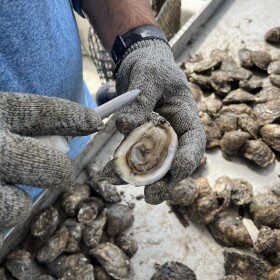
The award-winning podcast from WWNO/WRKF that dives deep into the environmental issues facing coastal communities on the Gulf Coast and beyond. Sea Change will bring you stories that illuminate, inspire, and sometimes enrage, but above all, remind us why we must work together to solve the issues facing our warming world. The podcast will help document our changing coasts with accountability journalism that’s too often missing from today’s media while sharing captivating stories from the people dealing with the most significant and complex problems of our time.
Hosted by Carlyle Calhoun, the show is based out of New Orleans, Louisiana which — perhaps more than any other place — embodies the existential threat of climate change. But like the city known as the Big Easy — Sea Change will also showcase joy, and resiliency — and tell powerful stories of people making a difference.
Also broadcast on 89.9 FM at noon during Louisiana Considered every other Friday.
Sea Change is distributed by PRX and is a part of the NPR Podcast Network.
Made possible with major support provided by the Gulf Research Program of the National Academy of Sciences, Engineering, and Medicine and The Water Collaborative. WWNO’s Coastal Desk is supported by the Walton Family Foundation, the Greater New Orleans Foundation, and the Meraux Foundation.
-
In Part 2, we will discuss building land, a vital part of coastal restoration, and often a highly controversial one. We delve into the thorny politics of human-led land-building projects, but first, we examine how the river builds land when left to its own devices. A process many are trying to imitate.
-
Louisiana is a world leader in coastal restoration. Many would even say number one. The media is full of stories about the coastal land loss crisis in Louisiana, the dire predictions of climate change and sea level rise, and polarizing accounts of controversial projects, but what is also true is that Louisiana is making tremendous strides in piecing this ragged shoreline back together little by little.
-
The amazing science behind understanding mysterious but critical ocean currents. And specifically, understanding the current in our backyard, the Gulf’s Loop Current.
-
The Gulf is one of the LAST places in the world where there is still a major wild oyster harvest. Lately, though, that harvest…is in trouble. In this episode, we ask: What can the oyster's downfall and resurrection tell us about a future of farming the ocean?
-
Part 1 of a 2-part series exploring the future of farming seafood in the Gulf. There’s a growing global movement to farm more and more of our seafood. Currently, proposals are being considered to establish massive fish farms in U.S. federal waters. The most likely first home to these new farms is the Gulf.















